Tuesday Feb 17, 2026
Tuesday Feb 17, 2026
Thursday, 2 December 2021 00:30 - - {{hitsCtrl.values.hits}}
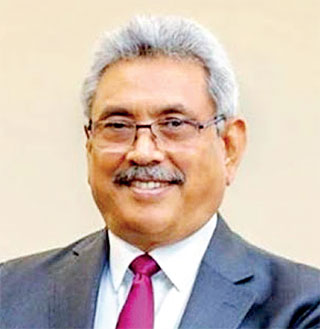
President Gotabaya Rajapaksa
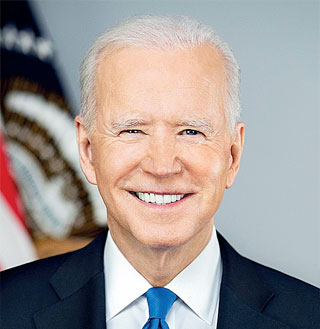
US President Joe Biden
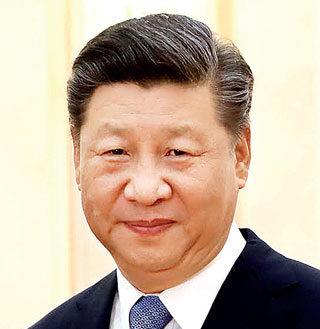
Chinese President Xi Jinping

Former US President Donald Trump
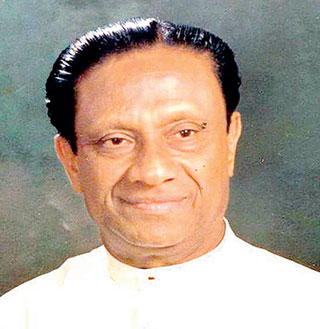
Former President Ranasinghe Premadasa
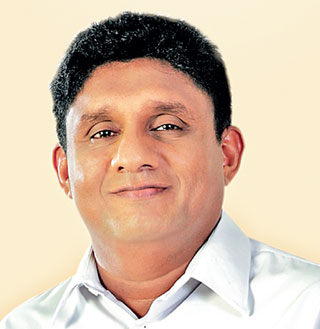
SJB and Opposition Leader Sajith Premadasa
|
 Sri Lanka, the oldest democracy in Asia and indeed Afro-Asia, finds itself left out of the (virtual) global Summit for Democracy (8-9 Dec) for which 110 states have been invited by President Biden. That’s hardly surprising given the current leadership in Sri Lanka. Why so?
Sri Lanka, the oldest democracy in Asia and indeed Afro-Asia, finds itself left out of the (virtual) global Summit for Democracy (8-9 Dec) for which 110 states have been invited by President Biden. That’s hardly surprising given the current leadership in Sri Lanka. Why so?
The summit was a promise that Joe Biden made at least a year before he was elected. One of Biden’s deeply-felt ideas is that the USA must retrieve the high ground of its own democratic values and commitments which President Trump traduced.
Apart from its intrinsic importance, he feels that the contestation with China is taking place in two dimensions. One is the great power competition. In that realm, President Biden has been trying to cool things down so that there is no inadvertent clash. The virtual summit with President Xi is an example of that endeavour.
The other dimension is that of the competition between systems as reflected in the contest of values, norms, ideas, ideologies. Biden is acutely aware that China promotes its belief that its system is superior to that of democracy due to its better outcomes in terms of the delivery of material public welfare. This was one of the arguments woven into the backcloth of Joe Biden’s two massive bills for infrastructure development and social spending.
He believes that the US should not merely have a network of strategic alliances and allies which can meet contain China (and Russia) in the great power competition. He also believes that the USA should lead the struggle in the battle for democracy as an idea, and that this requires a concerted global effort; an in-gathering of global forces. December’s summit is the first of two, the other in 2022.
Democracy vs. autocracy
For Biden, the great power competition can be managed, but the battle of ideas—which he has consistently and correctly billed as ‘autocracy vs. democracy’—is the more important existential one. It is that battle that he feels is the greatest challenge that he faces and indeed this generation faces.
He perceives it not merely as an external battle; it is internal to America too. This is one of the reasons he came out of retirement to battle Trump. Biden sees an organic link between ultranationalism and autocracy, and Donald Trump together with the Ku Klux Klan and proto-Nazi fringe that supported him as the domestic ‘axis of evil’ he felt compelled to do battle against. In his campaign he often said that what was at stake was no less than a battle for the soul of America.
Biden felt that Trump was also unable to lead the USA successfully in the great power competition against China, though Trump had escalated the US response, because as an ultranationalist with pronounced autocratic tendencies, there was an ideological continuum between the President of the USA and the President of the USA’s greatest competitor, China and of the latter’s greatest ally, Russia.
China and Russia had given evidence of this by embracing rightwing, ultraconservative regimes and formations, a classic example being the Myanmar junta.
Now, it seems that Joe Biden, a practicing Catholic, having narrowly won the battle for America’s soul, is waging the battle of ideas globally. The global Summit for Democracy is an effort at coordination, consensus and coalescence.
Obviously Biden never felt that the USA itself was not a democracy in terms of its system, even while he denounced Trump as an autocrat. Equally obviously, had Trump been a leader of another country, he would not have been invited to the summit.
GR’s exclusion
Sri Lanka’s exclusion from the global summit is an estimation that Sri Lanka today is led by someone who cannot be invited to a summit on democracy because he is hardly committed in his actions and discourse, to the values and norms of democracy, and the superiority of democracy as a system.
So, it is not an indictment of Sri Lanka’s democratic system. It is that the incumbent Sri Lankan regime and its ethos, are closer to autocracy than democracy. That is hardly debatable. When President Gotabaya Rajapaksa tells President Xi on the record, twice, that he wishes “to learn the governance experience of the Communist Party of China”, he cannot realistically be expected to be invited to the US President’s global summit on democracy. He is no longer in the camp of democracy. His presence and participation at the summit would have undermined the very purpose of it.
Indeed, President GR is also the perfect example of Biden’s hypothesis of Trump and Xi being on an autocratic continuum.
By hiding behind national and state sovereignty, autocrats bring discredit to the notion of sovereignty, just as liberals, by trashing sovereignty, have brought discredit to liberalism.
No people, certainly not the Sri Lankan, like their rulers to raise their voice angrily at them and certainly not after inflicting needless material pain on them.
That President Gotabaya Rajapaksa will enjoy only one term as an elected president is likelier by the day, but one cannot rule out ill-advised, extra-electoral wargames.
Now that his regime exists outside the family of democracies and inasmuch as Sri Lanka is located at the crossroads of the main theatre of contestation between the USA and China, an autocracy which is an allay of China and opts for further militarisation, will be perceived as target-hardening by and a strategic escalation which benefits the PLA, on India’s southern flank.
In the Netflix series ‘Cowboy Bebop,’ based on the iconic anime of the same name, the hero Spike Spiegel, formerly named ‘Fearless’ (played by Johnny Cho) tells his opponent of the moment “we can do this the easy way or we can do this the fun way”. Any local military misadventure based upon the domestic misreading of the goodwill and power-projection capacities of China and Russia given Sri Lanka’s location (way outside the ‘near abroad’ of both Beijing and Moscow), would give the Quad-AUKUS, reinforced by the broad bloc that emerges from Biden’s global summit on democracy, the “fun way” of Great Power contestation, breaking off a politically, economically and geo-strategically ‘weak link’ in China’s chain of strategic alliances in the Indo-Pacific.
Democratic opposition
It would be quite wrong of Sri Lanka’s liberal democrats to see themselves as the kindred spirits of Joe Biden and the natural agency of his thinking. Biden belongs to the wing of the US Democrats that understood the sources of the surge by autocratic rightwing ultranationalism which had broken into the white working-class base of the Democrats. He understood that economic distress, poor public services and growing inequality fuelled by the model of neoliberal globalism and elitist cultural cosmopolitanism alienated entire social swathes and areas, leaving them open to the Tea Party-to-Trump tendency.
Biden’s blue-collar roots (and Catholic social doctrine) made him a vigorous and explicit proponent of a Rooseveltian New Deal as manifested in his two massive spending bills. The Biden perspective was preceded and supported by a body of critical opinion produced by five outstanding US economists who served or were sympathetic to Democratic administrations from Bill Clinton onwards: Joe Stiglitz, Jeff Sachs, Paul Krugman, Robert Reich, James Galbraith.
The only political leader in Sri Lanka to even approximate that progressive perspective is Sajith Premadasa, who quoted Roosevelt and called for a New Deal in his hour-long parliamentary speech during the Budget debate.
The rest of the democratic Opposition and policy intelligentsia are still stuck with the economic thinking of US Republicans, UK Conservatives, European Christian democrats and worse, the Latin American Right (e.g., Ricardo Hausmann) against whose policies much of the continent rose in rebellion in the streets or elected left populist administrations.
Gotabaya Rajapaksa was the product of certain policies or rather the Sinhala swing against certain policies of the administration of the day (2015-2019). That these were much more the policies of the UNP rather than SLFP, is evidenced by Sirisena’s election to parliament at the head of 14 MPs, and Ranil’s solitary, unelected presence. The failure to identify, renounce and avoid such policies will only re-open the space for the next Gotabaya albeit by another name or more dangerously, another institutional agency.
Simply put, a repetition of such policies cannot but result in the repetition of the outcome. Except for Sajith Premadasa, whose father inherited a country “burning at both ends” due to the policies of the UNP’s elite Establishment and had to break decisively with them in order for the democratic system and the market economy to survive, the lesson does not seem to have been learned by the political class.
Economic model
All democrats can agree that broadly speaking, the Open Economy of J.R. Jayewardene is better than the “closed economy” of Sirimavo Bandaranaike-N.M. Perera and later, Gotabaya Rajapaksa. The Open Economy introduced a measure of economic democracy, in place of the economic serfdom that preceded it.
The question is, which kind of Open Economy is sustainable and therefore desirable? J.R. Jayewardene’s grandson Pradip quit the UNP of Ranil Wickremesinghe on the grounds that the latter’s version of the open economy was nothing like his grandfather’s, which had a robust role for the State. The example Pradip provided was the Mahaweli project.
Many of today’s democratic oppositionists know little about the 1977 JR model—which in practice was different from the B.R. Shenoy model of 1966. I recall Ranil Wickremesinghe telling me that he had asked JRJ why he didn’t go in for a “big bang” after the victory of 1977 and liberalise everything including food prices. JR had replied that he had tried that once as Finance Minister in the Dudley Senanayake administration of 1952 and it had triggered the August 1953 Hartal (uprising). He had learned his lesson, he said.
If in the next government, liberal economists attempt Shenoy-Hausmann experiments, they surely will learn the same lessons—but at what cost and whose?
The 1977 Open Economy model was itself seriously flawed, as Prime Minister Premadasa kept warning. When its inequities cumulated and exploded in the second insurrection, Premadasa had to pick up the pieces, but what he did was to implant his long-standing policies of ‘growth with equity’ on the foundation of the Open Economy, changing its orientation.
Premadasa’s Open Economy was the only model since the 1950s which did not cause either low growth/stagnation/unemployment or socioeconomic polarisation generating a social backlash. It ended because Premadasa was assassinated and the UNP abandoned his policies.
That UNP never led the country again and finally wound up extinct. Those who survived (i.e., today’s SJB) did so only because of Premadasa’s son who evoked his father’s brand and the memory of his policies, thus rising above the electoral cataclysm.
Premadasa’s distinctive programs from the ‘poottu paalam’ and pre-fab urban housing of 1965-1970 to the planned 15,000 projects of 1993 cannot be replicated today, but it is the Premadasa variant of the Open Economy i.e., the Premadasa Open Economy model, that must be the start-line for any macro-policy which wishes to avoid the sociopolitical instability and conflicts of the past and present.
Ronnie de Mel, the architect-builder of the 1977 Open Economy said on the record on his birthday this year that Sajith Premadasa and his policies were “the only hope for the country” and urged an Open Economy infused with “socialist values”.
‘Parliamentary cretinism’
The absurd assumption that autocracy is coterminous with the presidency and democracy with the parliamentary system, brings to mind Lenin’s phrase “parliamentary cretinism”.
The universal relevance of the American contribution not only enables the USA to stand at the helm of the world’s democratic camp but made America the pioneer of the Presidency which 4 of the 5 permanent members of the UN Security Council have adopted as an apex structure, irrespective of their divergent ideologies and economic systems.
The unreason which manifestly characterises the policies of President Gotabaya Rajapaksa is hardly proof of the dangers of the presidential system. It took the anti-Poll Tax riots to force Maggie Thatcher’s resignation into her third term as PM, while Donald Trump lost the presidency at the end of one term.
America opted for the presidential system precisely after it had made a revolution-cum-war of independence against Mad King George. Steeped as its leading elite was in Lockean liberalism it could very well have opted for the supposed virtues of the parliamentary system. Instead, it chose an ‘elected monarch’, countervailed and hemmed in by the Lockean separation of powers.
In Latin America, Simon Bolivar known as The Liberator because he defeated the armies of the Spanish crown, opted not for the parliamentarism that everyone knew existed in England, but followed North America in choosing the presidential system.
Why? A 21st century explanation comes from one of the most influential leftists of today, Antonio Negri who spent 24 years in prison and exile for his membership of a far-left Italian movement. In the massive volume ‘Empire’ (Harvard) of which he was the principal author (he wrote in Rome’s Rebibia prison), and in the follow-up ‘Empire and Beyond’ compiled upon release, Negri, formerly Professor of State Theory at the University of Padua and lecturer in Political Science at the University of Paris, celebrates US Constitutionalism or what he calls ‘the US constitutional project’.
He revisits the established fact of the influence of Greek historian and political analyst of the Roman period, Polybius, on Montesquieu, Locke and most consequentially the American Founding Fathers.
Aristotle made the breakthrough classification of democracy, oligarchy and monarchy, and identified the tendency of each to degenerate into its opposite and the cycle to begin again. Polybius found the solution to be a ‘mixed system’ which accommodated all three forms but used them to check and balance each other.
The American constitutionalists consciously studied him and built a hybrid system with the elected presidency, judiciary, and bicameral legislature.
Sri Lankans have such an advanced system albeit distorted by two swings to opposite extremes: the over-centralisation of the 18th and 20th amendments and the dysfunctional deadlock of the 17th and 19th amendments. The US system has powerful Congressional oversight but the UNP liberals gave the role of oversight to unelected civil society (NGO personalities).
Foreign policy
As the Budget debate on the Foreign Ministry vote revealed, ex-UNPers of the Mangala Samaraweera school inhabit an ideological time-warp.
They are naively unaware of the nuanced positioning of India in its foreign policy thinking and its interface with Russia and China (R-I-C) on certain issues of the world order. (Foreign Ministers of India, China and Russia call for “reformed” or “true” multilateralism - NewsIn.Asia – https://newsin.asia/foreign-ministers-of-india-china-and-russia-call-for-reformed-or-true-multilateralism/)
Nor are they aware of Biden’s brilliant National Security Advisor Jake Sullivan’s recent address to the Lowy Institute, signalling a return to Realism (he tends to reference Brent Scowcroft, President George HW Bush’s NSA), departing from the age of unipolarity and liberal ‘humanitarian interventionism’.
Obama names his greatest regret as the Libya intervention. Mangala protégés worship the three goddesses of interventionism (Hillary, Susan, Samantha) who propelled that catastrophe, opening the door for ISIL expansion.